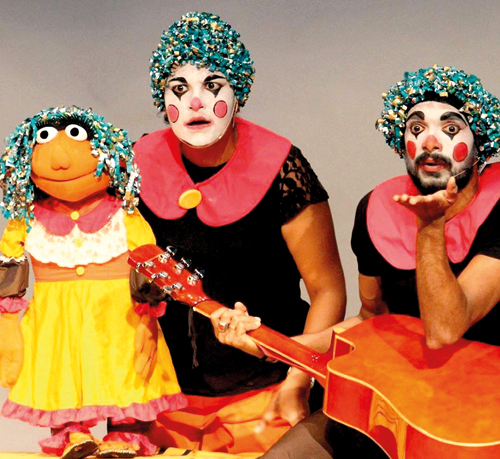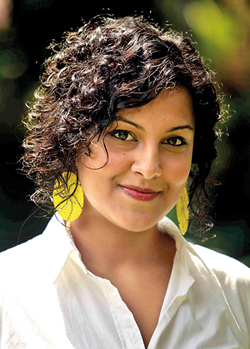Going digital with those familiar puppets

Entertainment and education: Sulochana's artistry keeps local culture alive
To most, their first introduction to Sulochana Dissanayake and Power of Play would have been from the opposite side of an elaborate stage erupting with life. Audiences would watch captivated as Sulochana and her team invented unique worlds and characters keeping traditional entertainment alive in the modern world.
Before becoming the founder and artistic director of Power of Play in 2011, Sulochana was a Theatre and Economics major of Bates College, USA. She studied puppetry and performing arts while gaining extensive international exposure across countries such as the USA, South Africa, and Indonesia. Since then, her artistry has helped to entertain, educate and keep culture alive by strengthening young and adult audiences’ connection to history through stories that remain vivid, original and fresh.
In this email interview Sulochana shares the experience of bringing her art online and life under lockdown.
- What has your experience been since shifting from your usual platform to a digital one?
The audience reach has been mind-blowing. From a physical audience of about 100-150 participants before COVID-19 struck, and seeing over 40,000 views on a LIVE Facebook video (broadcasted during lockdown) is quite…overwhelming.

Sulochana Dissanayake
It doesn’t directly translate though because you can never replace a live audience with a virtual one. The interactions are totally different and the impact isn’t comparable either. But still, it has incredible potential in widening your reach.
- What has the online response been like since beginning your live performances on the Power of Play Facebook page in May?
Very positive and encouraging. It tickles me that we have global viewers and a child in Brighton (UK) is commenting on our performance the same time as a child in Meerigama (Sri Lanka). Only once did we experience a troll who kept typing sexually explicit comments.
So I’d say it is a double edged sword and it requires so much more cross-functions from the brain than a live performance – you’ve got to perform, acknowledge the viewers, keep working their comments into the show – and remember that since we have a developing nation’s bandwidth, there’s always a delay in what you say reaching your audience and the same delay in getting their answers back. So, I’ve learnt a lot on swallowing my anxiety and embracing the ‘pause’ while learning the fine balance in keeping things rolling so the rhythm doesn’t drop. Still got a lot to learn!
- What are the benefits of education through entertain
The same benefits of learning anything joyfully – you remember it for life! Especially when dealing with difficult topics that we don’t want to discuss publicly – humour is the best weapon to engage communities to face issues directly, and collectively discuss the best way forward.
- Having performed for several years now, why do you believe some people respond better to non-traditional forms of communication?
After a decade of local and international performances, I’ve learnt that if you fascinate someone, you are able to engage them honestly. And once they’re engaged, you can involve them through interactive platforms – both physical and digital. And once they’re involved, generally, they strive to become part of the solution.
- You often re-enact stories with central themes. Through these stories you shed light on challenging issues surrounding topics such as equality. What is your approach to beginning these important conversations with your younger audience?
We base all our performance content for children, youth and adults on kindness, self-compassion and mutual understanding/respect. These are the cornerstones of equality. Gently weaving them in to a well-known folktale and/or our original productions, whilst highlighting age-old themes already present in these stories is the way we engage children in recognizing, owning and practising these values in their daily lives.
- How have you continued to inspire yourself during this uncertain time?
My children (son of 4 ½ and daughter of 1 ½ years) have been a huge source of inspiration to me as they kind of force you to live in the moment. So instead of spiralling down the slippery slope of losing sleep over cancelled shows, I focused on how to get through each day and also apply my art to homeschooling my older child.
We discovered a ton of fun activities we could do to learn numbers, letters and fine motor-skill development which included healthy doses of puppetry and story-telling.
Many activities were inspired by the numerous handouts shared for mothers with schooling children during lockdown so I can’t take full credit for all the creativity. I am eternally grateful for the internet and all social media that enabled the sharing of such supportive materials as it truly empowered me to create something to look forward to each day.
After I lost all domestic help, I’ve had to let go of any expectations of sticking to a regular schedule in terms of homeschooling but still we try to work in a little bit of fun to daily chores – singing while we cook, folding laundry together, and picking up our toys according the colours/categories called out etc. Any experience can be transformed into a learning opportunity with a touch of imagination.
- As someone who’s managed to spread joy through her art during this period, do you have any advice for people struggling to remain positive or express themselves creatively?
Advice is tricky. I don’t really think we can ever advise anyone else, as someone very rightly said, ‘we are all in the same storm – but not the same boat’. If I wasn’t lucky/privileged enough to deliver a programme earlier this year that secured us financially to see us through an indefinite present and future or have a partner who has a full time job that provides us with financial security, I don’t know if I’d have the safety required to continue to be creative and spread joy.
The only thing I can say is that my work and my mentors have taught me to apply playfulness as an approach in life and do simple daily reflective activities that develop a gratitude and resilience.
So here are the top five things I do daily which empower me to remain as positive as possible and keep creating my art;
1. Self-Compassion Mantra – uttered the moment I open my eyes every morning while lying in bed;
I am kind
I am smart
I am important
And a daily wish;
May I have a wonderful day.
If any difficulties arise, may I be kind, patient and efficient.
2. Self-compassion mantra for Emotional Resilience – throughout the day;
At every little moment of joy throughout the day, pausing for a second to take a quick mental snapshot of that moment while telling myself; This is a moment of joy. May I savour it with humility and gratitude
Likewise, at difficult moments, pausing for a second and telling myself;
This is a moment of suffering
Suffering is a part of life
May I be kind to myself in this moment
May I give myself the compassion I need
Makes a world of a difference to note the moments of joy (rather than glossing over them) and moment of difficulties (letting them pass rather than drowning in them)
3. Re-capturing the day’s high and low points before going to sleep (a polarity exercise which enhances acceptance of the ying/yang nature of life – e.g. no day is all good or all bad – even the best day has a low point and even the worst day has a high point)
This is one of my favourites to do with my son before bed. For adults, I’d highly recommend maintaining a bed-side journal and writing these highs and lows – makes wonderful reading material for later!
4. Thank you list before going to bed (to enhance gratitude to maintain a growth mindset – usually done right after #3 above)
5. Ending up with a summary of loving kindness meditation (ffu;S% Ndjkdj)
May I be happy healthy and free of sorrow
May all beings be happy healthy and free of sorrow
uu ksÿla fj;ajd” kSfrda.S fj;ajd” iqjm;a fj;ajd
ish¨q i;ajfhda ksÿla fj;ajd” kSfrda.S fj;ajd” iqjm;a fj;ajd
I usually sing the Sinhala phrase above like a lullaby a few times (before lying in complete silence and pretending I’m asleep) to put my children to sleep.
Usually, no: 3, 4 & 5 is a daily constant before bed time. No: 1 and 2 I do whenever I remember. But I find that even if someone is to do any one of these 5 steps regularly, the mental and physical benefits of self-compassion are immense. That’s what enables me to embrace a growth mindset even under the most challenging circumstances and live my best life 80% of the time.
The remaining 20% I yell, scream, threaten, cry, blank-wall and exhibit all other similar behaviours caused under extreme distress (‘distress’ translation – being in lockdown with very young children and no domestic help) but as my mentor Seema Omar always says, every relationship is a series of ruptures and repairs.
The above philosophies don’t mean you live a life free of ruptures – that’s not humanly possible. It just means you are able to repair the ruptures which actually makes the connections stronger.
1-3 of the above points I learnt through ‘The Good Enough Parent’ programme facilitated by Seema Omar and Tehani Chitty – which I highly recommend to any parent for personal growth and to learn simple daily approaches to combat domestic difficulties and foster deeper connections with your children and partner.
- Do you have any upcoming events?
Yes. We are starting customized Zoom sessions for children aged 4-6, 7-9 and 10-12 years.
We are also rolling out a series of customized webinars on Emotional Resilience and Self-Compassion for Corporates who have had to embrace the Work-From-Home policies due to COVID-19 and use these webinars as a platform to promote mental and physical wellbeing in adjusting to the ‘new-normal’.
Our webinar pilot was well received by a corporate client and now we are developing a series in collaboration with psychologists, drama and art therapists who will create interactive play-based webinars utilizing theatre, puppetry, story-telling, music, art and movement to promote emotional resilience and self-compassion in professional and personal environments.
For more details about customized programmes available for children and adults, please email info@powerofplay.lk or visit www.powerofplay.lk and www.facebook.com/powerinfoplay



